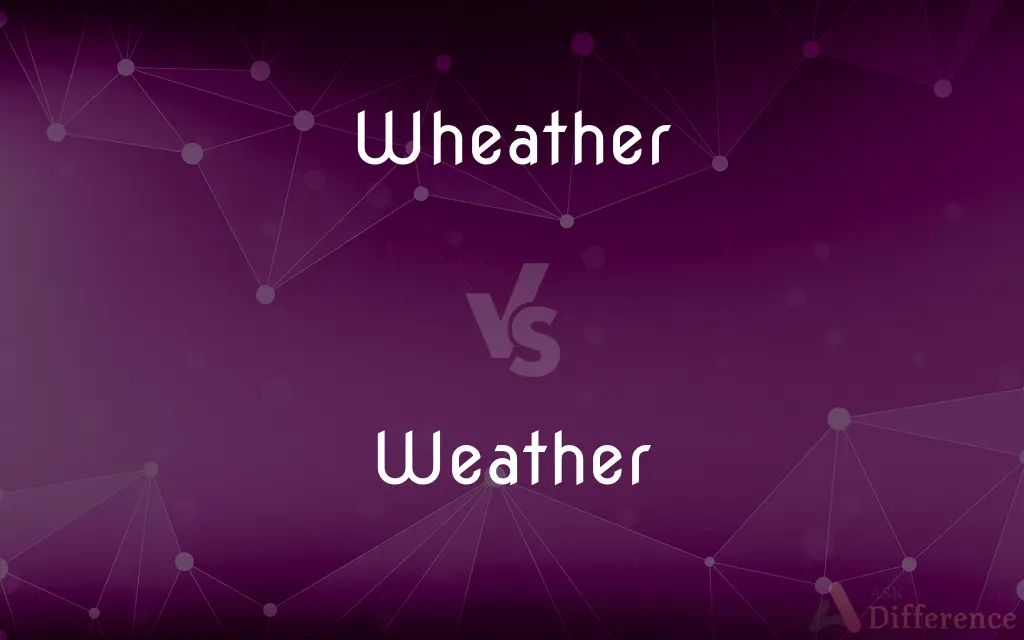Wheather vs. Weather — Which is Correct Spelling?
By Tayyaba Rehman — Updated on March 21, 2024
"Wheather" is incorrect; "Weather" is the correct spelling. Weather: the state of the atmosphere at a place and time.

Table of Contents
Which is correct: Wheather or Weather
How to spell Weather?

Wheather
Incorrect Spelling

Weather
Correct Spelling
ADVERTISEMENT
Key Differences
Remember "we" as in "we observe the weather".
Think of "whether or not" for "whether" and drop an "h" for "weather".
Associate "weather" with "feather" – both have one "h".
Picture a weather vane, not a "wheather" vane.
Keep in mind that "weather" affects "earth", both containing "e-a".
ADVERTISEMENT
How Do You Spell Weather Correctly?
Incorrect: She checked the wheather forecast before going out.
Correct: She checked the weather forecast before going out.
Incorrect: I love cold wheather.
Correct: I love cold weather.
Incorrect: The wheather report said it will rain later.
Correct: The weather report said it will rain later.
Incorrect: Is the wheather going to be sunny tomorrow?
Correct: Is the weather going to be sunny tomorrow?
Incorrect: The wheather is nice today.
Correct: The weather is nice today.
Weather Definitions
Climatic changes affecting a region over time.
The weather in Seattle is often rainy.
The meteorological conditions: temperature and wind and clouds and precipitation.
Sailors must be mindful of the weather at sea.
The atmospheric conditions at a specific location.
Always check the weather before hiking.
To undergo or endure the effects of the atmosphere.
The sculpture has weathered over the years.
The daily conditions of the atmosphere in terms of temperature, humidity, and precipitation.
The weather today is sunny and warm.
Weather is the state of the atmosphere, describing for example the degree to which it is hot or cold, wet or dry, calm or stormy, clear or cloudy. On Earth, most weather phenomena occur in the lowest layer of the planet's atmosphere, the troposphere, just below the stratosphere.
The state of the atmosphere at a given time and place, with respect to variables such as temperature, moisture, wind velocity, and barometric pressure.
Adverse or destructive atmospheric conditions, such as high winds or heavy rain
Encountered weather five miles out to sea.
The unpleasant or destructive effects of such atmospheric conditions
Protected the house from the weather.
Weathers Changes of fortune
Had known him in many weathers.
To expose to the action of the elements, as for drying, seasoning, or coloring.
To discolor, disintegrate, wear, or otherwise affect adversely by exposure.
To come through (something) safely; survive
Weather a crisis.
To slope (a roof, for example) so as to shed water.
To pass to windward of (a natural feature) despite adverse weather
Weathered Cape Horn in a gale.
To gain an advantageous position upwind of (another vessel), as in a race or naval battle.
To show the effects, such as discoloration, of exposure to the elements
The walls of the barn had weathered.
To withstand the effects of weather
A house paint that weathers well.
(Nautical) Of or relating to the windward side of a ship; windward.
Relating to or used in weather forecasting
A weather plane.
The short term state of the atmosphere at a specific time and place, including the temperature, relative humidity, cloud cover, precipitation, wind, etc.
What's the weather like today?
We'll go for a walk when the weather's better.
The garden party was called off due to bad weather.
Here and there, the weather on the sea allowed two of their friends to hear and see, too.
Unpleasant or destructive atmospheric conditions, and their effects.
Wooden garden furniture must be well oiled as it is continuously exposed to weather.
(nautical) The direction from which the wind is blowing; used attributively to indicate the windward side.
A situation.
(obsolete) A storm; a tempest.
(obsolete) A light shower of rain.
Facing towards the flow of a fluid, usually air.
Weather side, weather helm
To expose to the weather, or show the effects of such exposure, or to withstand such effects.
(by extension) To sustain the trying effect of; to bear up against and overcome; to endure; to resist.
To break down, of rocks and other materials, under the effects of exposure to rain, sunlight, temperature, and air.
(nautical) To pass to windward in a vessel, especially to beat 'round.
To weather a cape
To weather another ship
(nautical) To endure or survive an event or action without undue damage.
Joshua weathered a collision with a freighter near South Africa.
(falconry) To place (a hawk) unhooded in the open air.
The state of the air or atmosphere with respect to heat or cold, wetness or dryness, calm or storm, clearness or cloudiness, or any other meteorological phenomena; meteorological condition of the atmosphere; as, warm weather; cold weather; wet weather; dry weather, etc.
Not amiss to cool a man's stomach this hot weather.
Fair weather cometh out of the north.
Vicissitude of season; meteorological change; alternation of the state of the air.
Storm; tempest.
What gusts of weather from that gathering cloudMy thoughts presage!
A light rain; a shower.
Peace to the artist whose ingenious thoughtDevised the weather house, that useful toy!
To expose to the air; to air; to season by exposure to air.
[An eagle] soaring through his wide empire of the airTo weather his broad sails.
This gear lacks weathering.
Hence, to sustain the trying effect of; to bear up against and overcome; to sustain; to endure; to resist; as, to weather the storm.
For I can weather the roughest gale.
You will weather the difficulties yet.
To sail or pass to the windward of; as, to weather a cape; to weather another ship.
To place (a hawk) unhooded in the open air.
To undergo or endure the action of the atmosphere; to suffer meteorological influences; sometimes, to wear away, or alter, under atmospheric influences; to suffer waste by weather.
The organisms . . . seem indestructible, while the hard matrix in which they are imbedded has weathered from around them.
Being toward the wind, or windward - opposed to lee; as, weather bow, weather braces, weather gauge, weather lifts, weather quarter, weather shrouds, etc.
To veer, and tack, and steer a causeAgainst the weather gauge of laws.
The meteorological conditions: temperature and wind and clouds and precipitation;
They were hoping for good weather
Every day we have weather conditions and yesterday was no exception
Face or endure with courage;
She braved the elements
Cause to slope
Sail to the windward of
Change under the action or influence of the weather;
A weathered old hut
Towards the side exposed to wind
Weather Meaning in a Sentence
Before we go on our trip, let's check the weather forecast.
Many people prefer warm weather over cold.
In the mountains, the weather can change very quickly.
The weather in spring can be very unpredictable.
The weather report helps us plan our day.
During the summer, the weather is usually hot and sunny.
When the weather is nice, I like to go for a walk in the park.
The weather today is perfect for a picnic.
The teacher asked us to draw pictures of different kinds of weather.
In autumn, the weather starts to get cooler.
Bad weather can sometimes cause flights to be delayed.
Can you tell me what the weather will be like tomorrow?
Farmers rely on the weather to grow their crops.
Weather patterns are changing due to climate change.
Children love playing outside in snowy weather.
The weather station provides up-to-date information on weather conditions.
I hope the weather stays nice for our weekend plans.
We had to cancel our outdoor event because of the weather.
Weather apps on smartphones are very useful for planning outdoor activities.
The weather affects my mood; I'm happier when it's sunny.
Weather Idioms & Phrases
Under the weather
Feeling ill or not well.
I'm feeling under the weather today, so I might skip the meeting.
Weather the storm
To survive a difficult situation.
The company managed to weather the storm during the economic downturn.
Fair-weather friend
A person who is only a friend in good times.
When I lost my job, I realized who my fair-weather friends were.
Common Curiosities
Which vowel is used before Weather?
It depends on the context, but often "the" or "a" can precede "weather".
Why is it called Weather?
The term "weather" comes from the Old English "weder" meaning air or sky.
What is the verb form of Weather?
"Weather" itself can be a verb, meaning to endure or withstand.
What is the pronunciation of Weather?
The pronunciation is /ˈwɛðər/.
What is the singular form of Weather?
"Weather" is the singular form.
Which preposition is used with Weather?
"In" is commonly used, as in "in the weather".
What is the root word of Weather?
The Old English word "weder" is the root of "weather".
Is Weather an adverb?
No, "weather" is not an adverb.
Is Weather a negative or positive word?
"Weather" is neutral. Its perception as negative or positive depends on context.
Which article is used with Weather?
Both "the" and "a" can be used, as in "the weather" or "a weather phenomenon".
Which conjunction is used with Weather?
Any conjunction can be used with "weather" depending on the sentence.
Is Weather a vowel or consonant?
"Weather" is a word containing both vowels and consonants.
Is Weather a countable noun?
Generally, "weather" is uncountable, but in specific contexts like different kinds of weather conditions, it might be considered countable.
Is the word “Weather” a Direct object or an Indirect object?
"Weather" can function as a direct object, depending on the sentence.
How do we divide Weather into syllables?
"Weather" can be divided as: wea-ther.
What is another term for Weather?
"Climate" is related, though it refers more to long-term conditions.
What is the opposite of Weather?
There isn't a direct opposite, but in terms of conditions, "calm" can be opposite to "stormy".
What is the plural form of Weather?
"Weather" doesn't have a typical plural form, but "weathers" can be used in certain contexts like varying conditions or experiences.
Is the word Weather imperative?
No, "weather" is not imperative.
What is a stressed syllable in Weather?
The first syllable, "wea," is stressed.
What is the first form of Weather?
As a verb, the first form is "weather" (to weather).
How many syllables are in Weather?
There are two syllables in "weather".
Which determiner is used with Weather?
Determiners like "this," "that," "the," and "some" can be used with "weather".
What is the second form of Weather?
As a verb, the second form is "weathered."
What is the third form of Weather?
As a verb, the third form is also "weathered."
How is Weather used in a sentence?
"The weather today is quite unpredictable, with sudden rain showers and bursts of sunshine."
Is Weather an abstract noun?
Not exactly. While you can't touch "weather" itself, its effects and conditions are tangible.
Is Weather a collective noun?
No, "weather" is not a collective noun.
Is the word Weather a gerund?
No, "weather" is not a gerund.
What part of speech is Weather?
"Weather" can be a noun or a verb.
Is Weather a noun or adjective?
"Weather" is primarily a noun, but can also be a verb.
Is the Weather term a metaphor?
"Weather" itself is not a metaphor, but it can be used metaphorically (e.g., "weather the storm").
Share Your Discovery

Previous Comparison
Propogate vs. Propagate
Next Comparison
Conceirge vs. ConciergeAuthor Spotlight
Written by
Tayyaba RehmanTayyaba Rehman is a distinguished writer, currently serving as a primary contributor to askdifference.com. As a researcher in semantics and etymology, Tayyaba's passion for the complexity of languages and their distinctions has found a perfect home on the platform. Tayyaba delves into the intricacies of language, distinguishing between commonly confused words and phrases, thereby providing clarity for readers worldwide.













































